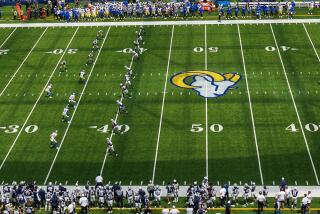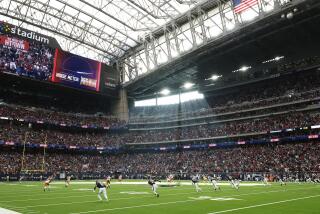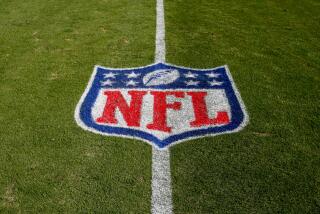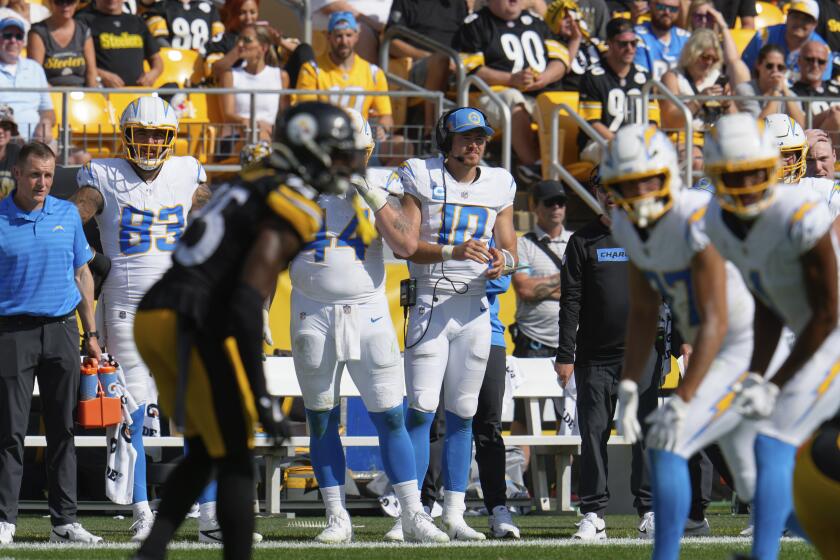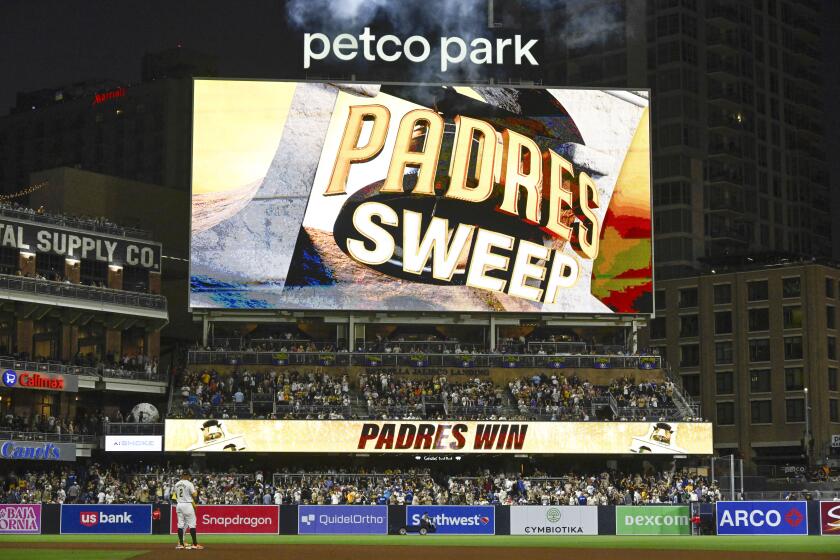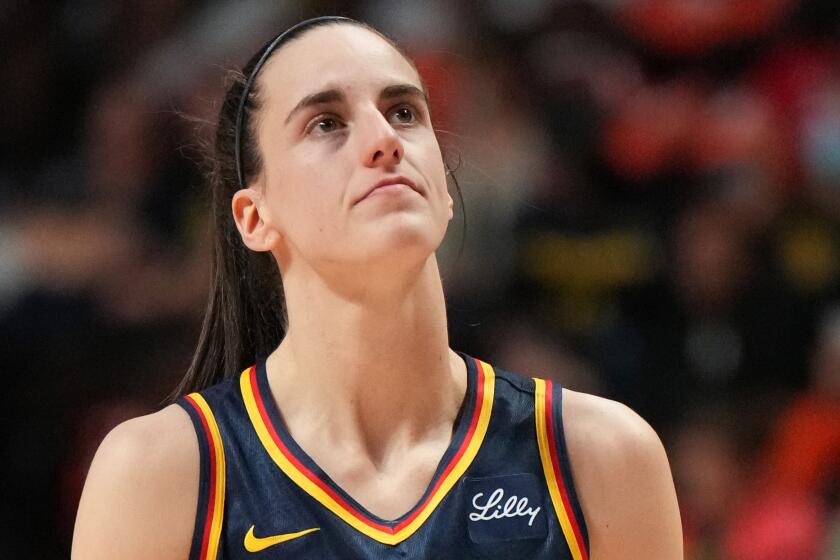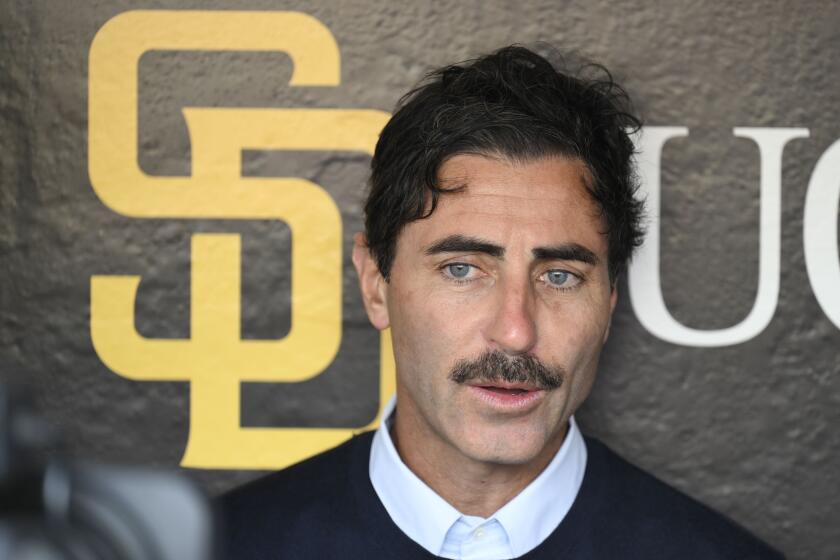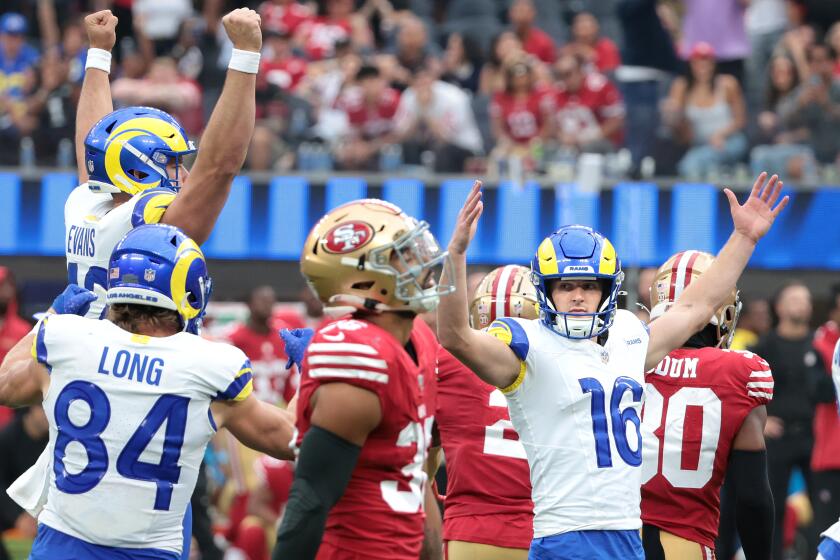NFL’s new national anthem policy: Players must stand if on field but can opt to stay in locker room
NFL owners reached a consensus Wednesday on a policy governing players’ conduct during the national anthem, addressing a subject that drew harsh criticism from President Donald Trump after some players decided to kneel to protest the treatment of African-Americans in the U.S.
Under the new policy, players who do not choose to stand for the anthem before games will have the option of staying in the locker room. But a club will be fined if players or personnel are on the field and do not stand “and show respect for the flag and the anthem.”
“We want people to be respectful of the national anthem,” NFL Commissioner Roger Goodell said. “We want people to stand — that’s all personnel — and make sure they treat this moment in a respectful fashion. That’s something we think we owe. [But] we were also very sensitive to give players choices.”
Shortly after the NFL announced its new policy at the league’s annual May meetings, the NFL Players Assn. tweeted its response and lamented that it was not consulted about the decision.
“The vote by NFL club CEOs today contradicts the statements made to our player leadership by Commissioner Roger Goodell and the Chairman of the NFL’s Management Council John Mara about the principles, values and patriotism of our league,” the NFLPA stated.
“Our union will review the new ‘policy’ and challenge any aspect of it that is inconsistent with the collective bargaining agreement.”
What has yet to be defined is precisely what constitutes “showing respect” for the flag. Does that mean players cannot raise a fist during the anthem, as some have, or lock arms?
“I don’t know that it will be hard to define what a protest is,” said Art Rooney II, president of the Pittsburgh Steelers. “I think standing at attention is a pretty simple concept.”
Although those owners who voted unanimously supported the policy, there was at least one abstention, the San Francisco 49ers.
“I think we have to have a deeper conversation with our players,” said Jed York, 49ers chief executive. “When I look at all the things we’ve started in social justice reform, I think there’s more to it. I think there’s ambiguity in terms of what’s respectful and what’s disrespectful.”
The issue of players refusing to stand for the anthem has been a flashpoint for the league since Colin Kaepernick, then San Francisco’s quarterback, first began kneeling in 2016 to protest the treatment of blacks in the U.S. by law enforcement. Many players around the league followed suit, but the protests had largely subsided until President Trump challenged the practice at a rally last season, reigniting the controversy.
League owners had been sharply divided about how to proceed, with some saying they should require players to stand and others arguing they wanted players to stand but should not mandate it.
“It was unfortunate that on-field protests created a false perception among many that thousands of NFL players were unpatriotic,” Goodell said in a written statement. “This is not and was never the case.”
Dallas Cowboys owner Jerry Jones told reporters Tuesday that the league is ready to move past the issue.
“I’m not trying to diminish issues of our rights here, but the No. 1 thing is our fans, and I know our fans want us to zero in on the game, zero in on football,” Jones said. “They want to come to the game and get away from a lot of the other issues that are out here.
“So from my standpoint, I’m trying to figure out the very best way for when somebody thinks NFL, they think about who’s starting at quarterback and who’s going to come out hot in the third quarter. We’ve got to make sure that whatever we decide here, it’s oriented toward getting our minds on what’s going on on the football field.”
The policy the league had in place said players must be on the sideline for the anthem, and it recommended but did not require them to stand for the anthem.
Kaepernick, who opted out of his contract with the 49ers after the 2016 season and remains unsigned, has a pending grievance that accuses teams of colluding against him to ban him from the league.
Meanwhile, Goodell and team owners have worked with a coalition of players to create a social justice agreement that provides funds to community activism projects supported by the players.
York said the 49ers plan to shut down their concession sales during the anthem.
“I don’t think we should be profiting if we’re going to put this type of attention and focus on the field and on the flag,” he said.
By fining the teams as opposed to individual players who protest, the NFL in theory would sidestep the prickly issue of punishing players for exercising their 1st Amendment rights, which would trigger pushback from the players’ union and elsewhere. The team then would make the decision of how to reconcile that with the player.
“When I look at fining people, the conversation I want to have with our players is, ‘Do you want us to have a conversation with the league, or could we come together and figure out if we could write a check to a group that’s doing work? Can do we do something collectively that might be a better way to spend money?’ I just think that there’s a more encompassing approach that we, the 49ers, can take,” York said.
“But I’m proud that the league is allowing teams to come up with their own work rules. This allows us to have our own work rules.”
Follow Sam Farmer on Twitter @LATimesfarmer
UPDATES:
11:50 a.m.: This article was updated with additional quotes and background information.
10:25 a.m.: This article was updated with a statement from the NFLPA.
This article was originally published at 8:55 a.m.
More to Read
Go beyond the scoreboard
Get the latest on L.A.'s teams in the daily Sports Report newsletter.
You may occasionally receive promotional content from the Los Angeles Times.

